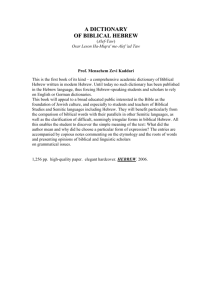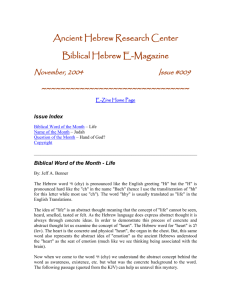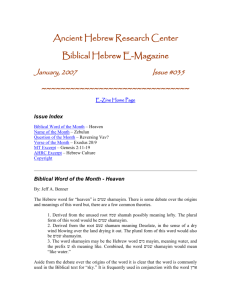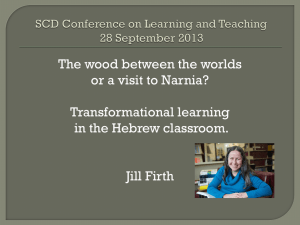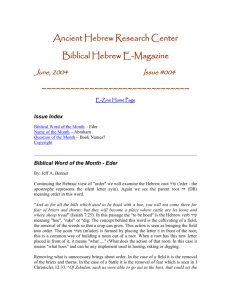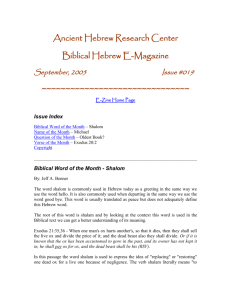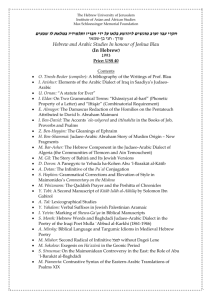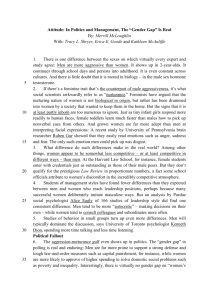Biblical Hebrew E-Magazine - Ancient Hebrew Research Center
advertisement
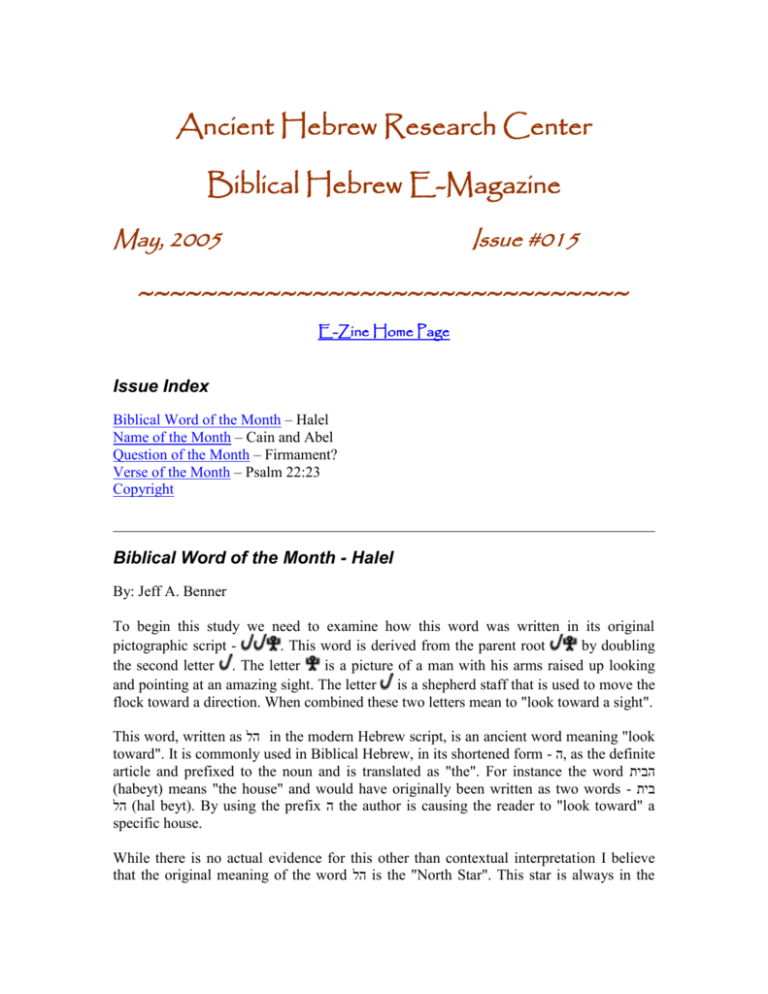
Ancient Hebrew Research Center Biblical Hebrew E-Magazine May, 2005 Issue #015 ~~~~~~~~~~~~~~~~~~~~~~~~~~~~~~~ E-Zine Home Page Issue Index Biblical Word of the Month – Halel Name of the Month – Cain and Abel Question of the Month – Firmament? Verse of the Month – Psalm 22:23 Copyright ________________________________________________________________________ Biblical Word of the Month - Halel By: Jeff A. Benner To begin this study we need to examine how this word was written in its original pictographic script . This word is derived from the parent root by doubling the second letter . The letter is a picture of a man with his arms raised up looking and pointing at an amazing sight. The letter is a shepherd staff that is used to move the flock toward a direction. When combined these two letters mean to "look toward a sight". This word, written as הלin the modern Hebrew script, is an ancient word meaning "look toward". It is commonly used in Biblical Hebrew, in its shortened form - ה, as the definite article and prefixed to the noun and is translated as "the". For instance the word הבית (habeyt) means "the house" and would have originally been written as two words - בית ( הלhal beyt). By using the prefix הthe author is causing the reader to "look toward" a specific house. While there is no actual evidence for this other than contextual interpretation I believe that the original meaning of the word הלis the "North Star". This star is always in the Biblical Hebrew E-Magazine same northern location in the night sky every night and used as a guide to the traveler. It is a light that is "looked toward" to find direction. The verb ( הללhalal) means to "shine" as seen in Isaiah 13:10 - " and the moon shall not cause its light to shine ". This same word is also translated as "praise" as in Psalm 117:1 "Praise Yahweh, all you nations! Extol him, all you peoples!" The full meaning of this verse is that all people are to look to God as the light of their journey that will guide and lead them on life’s journey. Throughout the Tenach/Old Testament our life is seen as a journey such as in Exodus 18:20 - "and you shall teach them the decrees and the Torahs, and make them know the path in which they must walk and what they must do". Just as the North Star is the shining light that guides the traveler, God is the shining light that guides us on our journey. ________________________________________________________________________ Name of the Month – Cain and Abel By: Jeff A. Benner The names Cain and Abel are Latin/English transliterations of the Greek names as found in the Septuagint (2,000 year old Greek translation of the Hebrew). In Greek, Cain is (Kain) and Abel is (Abel). These are in turn Greek transliterations of the Hebrew. In Hebrew Cain is ( קיןqayin) and Abel is ( חבלhavel). The word ( קיןqayin) means to acquire or possess something which is why Eve (chavah in Hebrew) said "I have gotten/acquired (qanah) a man" (Gen 4:1). The word חבלmeans to be empty, often translated as vain or vanity in the sense of being empty of substance. In Hebrew thought ones name (Shem in Hebrew literally meaning breath or character) is reflective of one’s character. The Hebraic meanings of the names of "Cain and Abel" are windows into their characters. Cain is a possessor, one who has substance while Abel is empty of substance. Another interesting fact about these two that is often overlooked is that Cain and Abel are the first twins. In normal Hebraic accounting of multiple births the conception then birth of each child is mentioned such as in Genesis 29:32,33 - And Leah conceived and bore a son... She conceived again and bore a son... But notice how it is worded in Genesis 4:1,2 - she conceived and bore Cain... And again, she bore his brother Abel. There is only one conception but two births. The Hebrew word for "again" is "asaph" meaning to add something, in this case the birthing of Abel was added to the birthing of Cain. 2 Biblical Hebrew E-Magazine _______________________________________________________________________ Question of the Month – Firmament? By: Jeff A. Benner Q: What is the firmament of Genesis 1:6? A: This is a very good example of how the Hebrew language works. English and all other modern languages are abstract oriented. We commonly use words that have no connection to any physical activity or object. Hebrew, an ancient eastern language, is very different and all words are related to a physical action or object. Many times it helps to look at all of the uses of a particular word and other words from the same root to get an idea of what that word really means. The word raqiya comes from the root word raqa which can be found in several passages including Isaiah 40:19 - "The idol! a workman casts it, and a goldsmith overlays it with gold, and casts for it silver chains." The word "overlay" is the verb root raqa. Raqa is the process of hammering out a piece of gold or other metal into thin plates which was then applied to a carved or molten image. Also see Numbers 16:39 - "So Eleazar the priest took the bronze censers, which those who were burned had offered; and they were hammered out as a covering for the altar". Here, the phrase "were hammered out" is the verb root raqa. The gold was hammered into thin sheets then laid over the surface of the altar. The word raqiya is literally a "hammered out sheet". There are some scientists who have speculated that before the flood there was a thick sheet of water surrounding the earth up in the atmosphere. It is then possible that the "floodgates of heaven were opened" at the beginning of the flood, was the collapse of this sheet of water. It is estimated that the sheet of water would have filtered out harmful sun rays and contributed to the longevity of life on earth before the flood. ________________________________________________________________________ Verse of the Month – Psalm 22:23 (vs 22 in English Bibles) By: Jeff A. Benner 3 Biblical Hebrew E-Magazine אֲ סַ פְּ ָרה ִׁש ְּמָך לְּ ֶאחָ י בְּ ֹתוְך ָקהָ ל אֲ הַ ְּללֶ ךָ׃ I will declare thy name unto my brethren: In the midst of the assembly will I praise thee. (ASV) ( אֲ סַ פְּ ָרהa-sap-rah) The root word is ספר. You may be familiar with the noun form of this root, sepher, meaning scroll or book. The verb form, saphar, means to tell or give and account of something. The אidentifies this as a verb and the subject of the verb is first person, singular, imperfect tense meaning "I am" or I will". ( ִׁש ְּמָךshim-kha) The word ( שםshem - the letter mem, מ, is written as םwhen at the end of a word) is usually translated as "name" but more literally means breath or character as the ancient Hebrews understood the breath of an individual to be his character. The suffix ךis a possessive pronoun meaning "of you". Combined this word means "character of you" or "your character". ( ל ְֶּאחָ יle-e-hhai) The word ( אחahh - the "hh" is pronounced hard as in the "ch" in the name Bach) means brother. The word ( אחיםahhiym) is the masculine plural form meaning "brothers". The Word ( אחיahhiy) is first person possessive or "my brother". But when the plural and first person possessive are combined the word ( אחיachay - the "ay" is pronounced like the "y" in the word fly) as masculine plural nouns always drop the םwhen in the possessive. The prefix לmeans to or for. ( בְּ ֹתוְךbe-tokh) The word ( תוךtavekh or tokh) means middle, center or among. The prefix בmeans "in". ( ָקהָ לqa-hal) This word simply means a gathering as in an assembly. Originally it was used for a flock of sheep which are protected and cared for by the shepherd. ( אֲ הַ ְּל ֶל ָךa-hhal-le-ka) The word ( הללhalal) is the word discussed above literally meaning to shine. The א identifies this as a verb and the subject of the verb is first person, singular, imperfect tense meaning "I shine" or I will shine". The suffix ( ךka) identifies the object of the verb as masculine singular. The following is a literal rendering of this verse from its Hebraic meaning. I will tell the story about your character to my brothers in the flock; I will show them your shining light that will lead them. 4 Biblical Hebrew E-Magazine ________________________________________________________________________ Copyright © 2005 Jeff A. Benner Ancient Hebrew Research Center Please feel free to use, copy or distribute any material within the "Biblical Hebrew E-Magazine" for nonprofit educational purposes only. ________________________________________________________________________ 5
